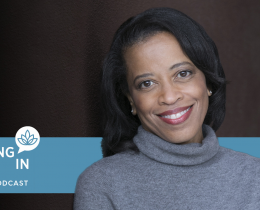Omega: Can you describe your journey through grief?
Gwen: It's been a difficult journey. But, in order to get past the pain, you have to take a chance and get out there. You have to channel your anger and convert your outrage to raise awareness about the injustice that people of color are suffering and enduring on a day-to-day basis. We have to find a way to put a stop to this ill treatment of people of color.
Omega: You're working with a lot of other mothers who have lost a child or children to police violence. What is that like?
Gwen: We galvanize with mothers who were high profile, mothers who were not high profile, and mothers who never got a day in the paper to say what happened to their children. And we band together and embrace those mothers who lost children to street violence because the pain is the same.
We tell them that they do have a voice. They have to get out there and they have to say their child's name. Because their child is gone, they’re the only one who can stand up for them now. We try to teach them in that way. We tell them we are not letting the world forget who our child was or who our child is and you have to do the same.
We go to each other's events because each one has their own organization and we laugh together, we cry together. It’s not unusual for one of the mothers to call you or text you at three or four o'clock in the morning if they're having a moment.
We lean on each other and it's a good thing because you feel like you can talk to someone who understands your pain, who has the same pain as you. It does work. We have come together and have made a difference in some of the mothers’ lives, including the ones who couldn't get out there and speak for their sons.
Omega: Do other family members, beyond mothers, get involved, too?
Gwen: There are other family members, though, that come with us. We don't only have mothers—we have aunts, brothers, and sisters who join us. We have one brother and sister with us now whose brother was shot by a cop. They tell us that their brother was like their father. They lost their mother at a very young age and the brother actually became the father. So, they were grieving hard because he was their go-to person. So, it's not only the mothers, we have other family members that are grieving hard for their loved ones also.
Omega: What have you learned about forgiveness through your experience? Have you found it possible to forgive?
Gwen: You know, it is possible to forgive—depending on who you're forgiving. First of all, I think a lot of people forget that a lot of mothers are trying to forgive themselves because, a lot of us think that maybe we should have been there that day. We second-guess. We feel a sense of guilt.
I second-guessed myself. I said, "Well maybe if my car hadn't broke down, I wouldn't of had to call my son to take me to work. He wouldn't have been in that place at that time."
Everyone—even the counselors—will tell you, "It's not your fault. You were not meant to be there that day." Which is true, in a sense. But we still feel that guilt and we have to be able to forgive ourselves before we can forgive anybody else.
Omega: What about forgiving others? Do you think that's important to healing or do you think it's just not possible?
Gwen: I'm a religious person, and we are taught to forgive. But, I just haven't brought myself to that stage yet, to forgive the person or the persons that murdered my son that day or who were involved in his murder. I just haven't. I pray about it a lot and I ask the Lord to guide me in that direction if that's the direction I should go. But, as of now, I have not found in my heart to forgive those people who have taken my son away from me.



